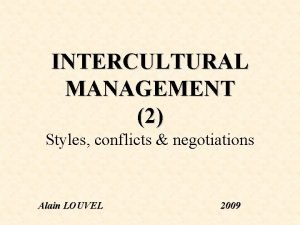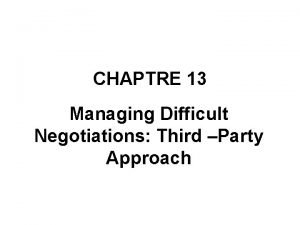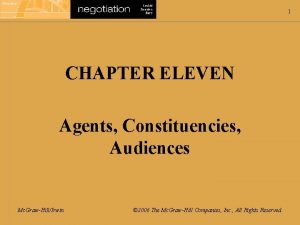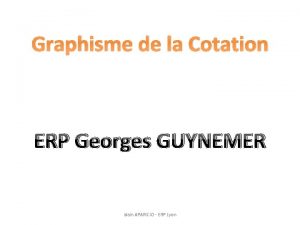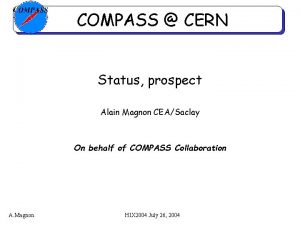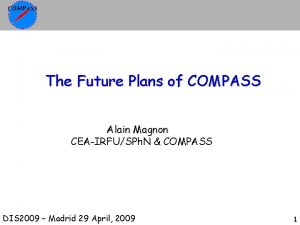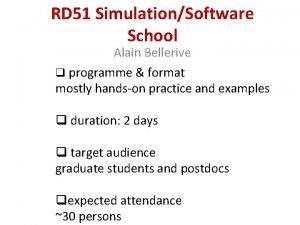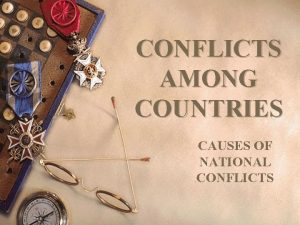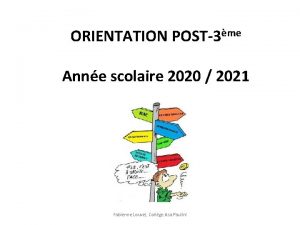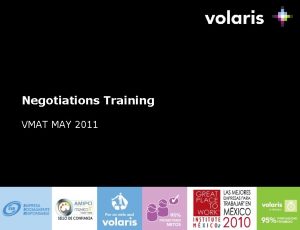INTERCULTURAL MANAGEMENT 2 Styles conflicts negotiations Alain LOUVEL
































- Slides: 32

INTERCULTURAL MANAGEMENT (2) Styles, conflicts & negotiations Alain LOUVEL 2009

REGIONAL MANAGEMENT STYLES

External INFLUENCES • NORTH AMERICAN model relationship with trade-unions show, “firms fair”, convention competition, research of profit self made man, self marketing entrepreneurship model, risky business, innovation, individual performance , “networking”, intranet, . . .

External INFLUENCES (2) • ASIAN MODEL chinese influence confucianism = moral, customs strong social links protocol, rank the group : no priority to the individual WARNING : cultural differences between Japan, China, Indonesia, . . .

External INFLUENCES (3) • EUROPEAN MODEL does it exist ? definition ? • Some variables : - French model, mediterranean - German model - Anglo-saxon model - Scandinavian model - “eastern” model, … • A lot of other variables ! But a common continental trend !

External INFLUENCES (4) • AFRICAN MODEL strong links with the “metropoles” (colonization) a modern-traditional “melting pot” firm as a real “family”, tribes “patrilineal” or “matrilineal” rules

BUT …. • There are national differences • “COUNTRY” COUNTRY dimensions are modified by “regional” sub-cultures • Some big influence BLOCKS exist ! • About the FUTURE ? Huge homogenous blocks with local cultural realities !

CULTURAL CONFLICTS in the firms

• Intercultural relationships are not always easy to manage ! • They create tensions and conflicts • CULTURAL SHOCK : domination, submission or riot, resistance • MECHANISM : “ culture is an analysis tool through which we are looking and judging the OTHER” • HIERARCHY / according to one’s own culture COMPARISON ===> DISTANCE

Which means…. • CULTURAL CATEGORIES if number of info is huge = classes infos / groups = specificities analysis emphasize intergroups similarities and intergroups differences • COMPARISON & HIERARCHY adhesion or reject / values difficult to react as the OTHER ! “alien” !

Which means…. (2) • EXAGERATION of CULTURAL DISTANCES : discrimination / risks and aims “focus” according to its own values defense system

COMMON MISTAKES at the origin of cultural conflicts

Simplification of REALITY • In front of “misunderstandable foreign” behavior, we are looking for stress limitation System balance…. Homeostasis … • Predetermined ideas help to reduce complexity, to increase security feeling and to enhance self-esteem • DEVALUATION OF THE OTHER !

• 1. STEREOTYPES : / categories instant beliefs, simplifying reality caricatures (german = worker) fixed and uncompleted image • 2. PREJUDICE : subjectivity coming to a conclusion before knowing (german = war) judgment based on personal environment or first sight impressions • 3. JUDGEMENTS OF VALUES : beauty ? Different from REALITY judgment

CONSEQUENCES ? • Relationship between groups = strengths relationships, risk of domination / “superior” values ! 1. Conformity to dominant culture conflict, rejection? 2. Consensus or compromise research avoidance / “open conflict” 3. minimum innovation

CONSEQUENCES ? (2) 4. Change in the polarization what is common to both sides = solution basis 5. Rupture, BREAK !

INTERCULTURAL NEGOTIATION

KEY POINTS • Knowing customs and cultural codes different reference systems BEFORE the NEGOTIATIONS !!! • words, facts, body language, attitudes = different meanings / cultures • TRANSGRESSIONS / cultural codes : behaviours, languages, gestures, … (ex: Finland / silence, distances, speaking interruption, …)

• Understanding the styles of behaviours for each negotiator : - sensation (USA) - instinct, impulse (Fr) - thinking, rationality (D) - feelings, emotion (Arg) • Huge differences between : Sensation-instinct & thinking-feelings

• Fragmenting the process into different steps: PREPARATION NEGOTIATION POSTNEGOTIATION • Identifying the styles of negotiation : conflict, distributive, win-lose or consensus, integrative, win-win “confrontation” or “cooperation” ?

• Adapting its strategy, tactic / contexts dealing with partners’ nature, characteristics, culture, environment • Being FLEXIBLE / tactics ! • The DINOSAUR-MOUSE history…

SUCCESS CRITERIA • STRICT and DEEP PREPARATION • ACTIVE LISTENING and EMPATHY • INTERCULTURAL RELATIONSHIP EXPERIENCE • KNOWLEDGE about COUNTRY, HISTORY, GEOGRAPHY, PEOPLE, CULTURAL SPECIFICATIONS

SUCCESS CRITERIA (2) • But also … LAW, REGULATIONS, COMMERCIAL MANNERS, HABITS have to be taken into account. • OPEN MINDED, PATIENCE, ADAPTATION • ACCEPTING the UNPLANNED FACTS • BE ABLE TO ADAPT TO CUSTOMERS’ BEHAVIOUR and CULTURAL VALUES !

REMEMBER ! • Big differences exist between : - business negotiation project, LT, built relationship - commercial negotiation “impact”, S&MT, forced relationship • There are many lists of frequent cultural risks • Beware of INTERCULTURAL COMMUNICATION in advertising !

A type of NEGOTIATION USA “chess” game direct strategy attack numerical superiority “death” MAT CHINE “Go” game Indirect strategy defence movement, asphyxia advantage + 1 piece

And about … FRENCH CULTURE perception

funny MAP of France !

* Attracted by POWER : France was powerful because of it’s glorious past ! * tend to see things in their historical context and relate contemporary events to their origins

FRENCH PSYCHOLOGY : « how can you govern a country that makes 365 kinds of cheese ? » DE GAULLE latin in their behaviour, influenced by the catholic faith * individuality : poor « team players » « l’état, c’est MOI ! » king LOUIS XIV



 Alain louvel
Alain louvel Expanding the pie negotiation
Expanding the pie negotiation Managing difficult negotiations
Managing difficult negotiations Procurement negotiations pmp
Procurement negotiations pmp One’s negotiation objective should be:
One’s negotiation objective should be: Cross cultural communication and negotiation
Cross cultural communication and negotiation How agents, constituents and audiences change negotiations?
How agents, constituents and audiences change negotiations? A behavioral theory of labor negotiations
A behavioral theory of labor negotiations Types of negotiations
Types of negotiations Procurements
Procurements Cyberharclement
Cyberharclement Psychose
Psychose Alain aparicio
Alain aparicio Alain magnon
Alain magnon Pont de normandie alain montois
Pont de normandie alain montois Alain tapp
Alain tapp Alain thierry montpellier
Alain thierry montpellier Alain mouttou
Alain mouttou Berrazi
Berrazi Alain chaney
Alain chaney Alain magnon
Alain magnon Crhm
Crhm Alain topor recovery
Alain topor recovery Alain colmerauer
Alain colmerauer Pps hélène et alain
Pps hélène et alain Alain devalle
Alain devalle Alain bellerive
Alain bellerive Alain dollet
Alain dollet Alain moulet
Alain moulet Alain franc
Alain franc Alain savary istres
Alain savary istres Alain coine
Alain coine Alain barriere
Alain barriere
